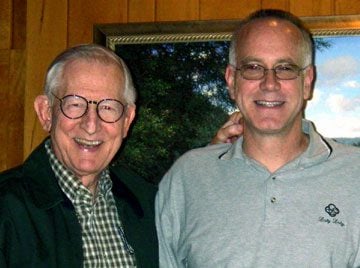It seems like almost everywhere I turn these days, I run into people questioning the continued use of the term “evangelical” if not the continued existence of evangelical Christianity. Most recently it was Tim Keller writing an article for the New Yorker called, “Can Evangelicalism Survive Donald Trump and Roy Moore?” Keller’s answer, in a nutshell, is that the kind of Christianity once called evangelicalism can and will survive, though the name “evangelical” may need to take a breather.

Keller’s not alone here. A recent article in the Washington Post bore this headline, “After Trump and Moore, some evangelicals are finding their own label too toxic to use.” This article focused mainly on Fuller Seminary in Pasadena, California, a seminary that has for decades identified as evangelical and drawn students who embrace that label. But, according to Fuller’s president Mark Labberton, things are changing. He reports that increasing numbers of Fuller students are asking:
“Am I part of a movement that identifies with things I actually think are personally and theologically repellent to me?” . . . . “If somehow I’ve gotten caught up in a movement like that . . . I could try to endlessly unpack it, or I could just abandon it.”
As one who works at Fuller, where I’m the executive director of the Max De Pree Center for Leadership, I would concur with Labberton’s observation, and not just because he is my boss’s boss.
Even the “Evangelical” section of Patheos, where my blog lives, has been featuring columns by significant thinkers who are questioning the future of the evangelical label. The highly-regarded historian George Marsden wrote a piece for the blog Anxious Bench entitled, “Can ‘Evangelicalism’ Survive Trump?” Marsden believes it may be prudent for Christians who once identified as evangelical to distance themselves from that label. Scot McKnight, one of the leading contributors to Patheos’s Evangelical channel, is even more bold with his title and recommendation: “Bury the Word ‘Evangelical’.” Here’s an excerpt from McKnight’s post:
Today the term evangelical in the USA means (supposedly) conservative in politics, and hence “Votes Republican.” This definition is not going away. The political folks have won.
Let the political evangelicals have the term.
Everyone else walk away. Call yourself something else.
McKnight proposes using “Christian” or your denominational affiliation. But, in the end, here’s his suggestion: Those who use “Evangelical” as a political label can have it. “Let the rest of us call ourselves Christians.”
Given what I’ve been reading and experiencing, I’m inclined to think that the label “Evangelical” is no longer helpful for many who would once have happily used this label. Why not? Because the popular and dominant meaning of “Evangelical” in our society has been narrowed to mean something like “a Christian who is white and who supports the political agenda of Donald Trump and his allies.” If you happen to fit in that category, then you can gladly identify yourself as an Evangelical. But if you don’t, even though you are committed to Jesus Christ as Lord and Savior, affirm the authority of Scripture, and believe as those once called evangelicals believe, you probably don’t want to be identified as an Evangelical.
McKnight says we should just call ourselves Christians, and I’m inclined, at least in part, to agree. But given the diversity of Christian expressions throughout the world, there are times when it would be helpful to have some kind of adjective added to “Christian.” It could be “I’m a Catholic Christian” or “I’m a Baptist Christian” or “I’m a non-denominational Christian” or “I’m a Bible-believing Christian.”
But what about those of us who once found “evangelical” to be a helpful identifier? Is there anything like “evangelical” available today? Mark Labberton doesn’t think so. He said, “What word do you put in its place? There’s no adequate or obviously adequate word to do that. . . . I’m ‘an orthodox Christian who cares deeply about being a follower of Jesus and wants to live with an open posture of engagement with culture.’ That’s not as tidy as simply saying, ‘evangelical.’ ”
No, it is not. But perhaps there is a somewhat tidy option. What about replacing “evangelical” with something like “gospel centered”? If you were to ask me what brand of Christian I am, I would be happy to say “gospel centered.” Similarly, if you were to ask me about where the De Pree Center falls in the spectrum of Christianity, I could truthfully say we are “gospel centered.”
Now, if you know the etymology of the word “evangelical,” you might accuse me of cheating here. “Evangelical” comes from the Greek root euangelion, which means “good news” or “gospel.” So, “gospel centered” is pretty close to the core sense of “evangelical.” (“Gospel” is from an Old English word meaning “good news.” If you don’t like “gospel centered,” you could go with “good news centered” instead. In the end, this might be better.)
Why do I like “gospel centered” or “good news centered” as a description of the kind of Christian I am? Because my faith and life have been profoundly shaped by the good news of what God has done and is doing in Jesus Christ. Because I am deeply moved by and devoted to the story of God found throughout Scripture, the story that contains the full good news of God’s creative initiation, gracious salvation, and future consummation. Because, for me, the whole Christian life is best understood as a response to and engagement with the God who has made himself known and claimed me through the gospel.
I realize that “gospel centered” does not adequately represent many of the things that have, in the past, made evangelical Christians distinctive. These distinctives, as laid out by David Bebbington in his influential study of evangelicalism are: “biblicism,” “conversionism,” “crucicentrism,” and “activism.” But, strictly speaking, the word “evangelical” doesn’t inherently cover these distinctives either.
Whether my proposal to replace “evangelical” with “gospel centered” convinces anyone or not, at least it might help move the conversation forward. And, to be honest, it helps me find language to describe the kind of Christian that I am and hope to be, one whose entire life is a reflection of and response to the gospel of God’s love in Jesus Christ, the gospel revealed in Scripture, the gospel that the world desperately needs to hear in words and experience in action.















